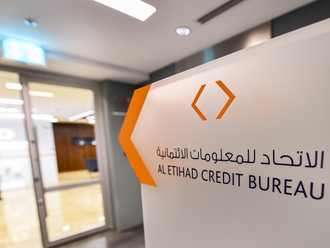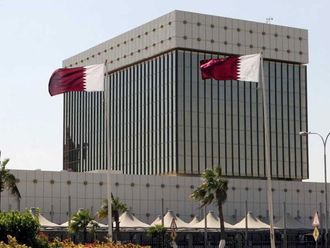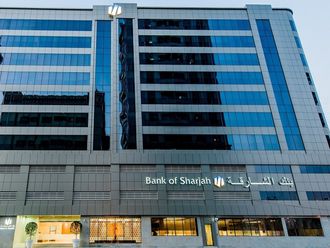Gulf developers are raising the most since 2009 from bond sales as Dubai’s debt repayment agreements and record-low regional yields help restore investor confidence.
Majid Al Futtaim Holding LLC, a UAE-based shopping-mall developer and operator, and Kuwait’s Al Argan International Real Estate Co were among companies that issued about $995 million (Dh3.64 billion) in the first six months, according to data compiled by Bloomberg. The sales compare with $500 million in 2011 and $2.45 billion in the first half of 2009, the data show.
Emaar Properties PJSC, the developer of the world’s tallest tower, met investors in London last week to sell bonds.
Gulf bonds have benefited from confidence Dubai will refinance financial obligations of its related entities and as investors seek safer-haven assets amid Europe’s financial crisis. Average yields on bonds from the six-nation Gulf Cooperation Council have dropped 95 basis points this year to a record 4.12 per cent on July 10, the HSBC/Nasdaq Dubai GCC Conventional US Dollar Bond Index show.
“The cost of issuance and the cost of debt have come down for a lot of these companies,” Yaser Abu Shaba’an, director of asset management at Emirates Investment Bank in Dubai, said by phone July 9.
“The region as a whole is now being perceived as a better risk return prospect than Europe even on the sovereign level.”
Growth prospects
Economic growth in the Gulf, home to three-fifths of the world’s oil reserves, will reach 5.3 per cent this year, according to International Monetary Fund (IMF) estimates in April. That is above an expansion of 2 per cent in the US and a projected contraction of 0.3 per cent in the 17-country Eurozone economies, the IMF forecast.
The UAE housing market is also stabilising after the downturn of 2008.
Home prices in Dubai plunged more than 65 per cent from a peak in mid-2008. The emirate’s debt restructuring helped push the yield on GCC bonds to a record 11.5 per cent in October 2008, according to the HSBC/Nasdaq Dubai GCC Conventional US Dollar Bond Index.
“In previous years, it was a very difficult environment to raise money full stop,” Khalid Howladar, senior credit officer at Moody’s Investors Service in Dubai, said by phone July 9.
“An overall improvement in the operating environment means it’s an easier market for real estate companies to raise finance.”
Dubai’s clout
Emaar raised $500 million from Islamic bonds last year and the yield on the 8.5 per cent notes due August 2016 declined 218 basis points this year to 6.02 per cent yesterday, according to prices compiled by Bloomberg.
In 2009, Abu Dhabi’s largest property developer Aldar Properties PJSC issued $1.25 billion of bonds, while government-owned Tourism Development & Investment Co sold $1 billion.
Europe risk
Still, real estate companies in the Gulf remain vulnerable to volatility in global markets and downward swings in property prices. The IMF will cut its estimate for global growth in 2012 from a 3.5 per cent estimate in April on weakness in investment, jobs and manufacturing in Europe, the US, Brazil, India and China, managing director Christine Lagarde said July 6.
Borrowers from the GCC, which includes Saudi Arabia, Kuwait, the UAE, Qatar, Bahrain and Oman, have sold $21 billion of bonds in the first six month of this year, Bloomberg data show.
That compares with $10.5 billion in the first half of last year and $8.6 billion in same period of 2010.
Gulf bonds returned 6.7 per cent so far this year, the HSBC/Nasdaq index show. By comparison, debt in the Middle East, which includes Lebanon and Jordan sovereign bonds, gained 5.7 per cent, according to the HSBC/Nasdaq Dubai Middle East Conventional US Dollar Bond Index.
In Saudi Arabia the passing of a mortgage law last week, after more than a decade in debate, will increase growth in the building and construction industry, ultimately benefiting developers, Moody’s Howladar said. The law will also help real estate companies in Saudi Arabia get funding for projects amid a shortage of homes estimated at 1.25 million by 2014, according to the kingdom’s ninth development plan.
Emaar, which along with other investors manages Jeddah-based Emaar Economic City, set initial price guidance of 6.5 per cent to 6.625 per cent on a possible seven-year Islamic bond sale, two people familiar with the matter said yesterday. The yield on Majid Al Futtaim’s 5.85 per cent sukuk due February 2017 fell 44 basis points last quarter to 4.4 per cent.
“This has been one of the best years for the region in terms of issuances just because the risk perception has improved for Middle East and Gulf assets, and there has been a search for yields globally,” Abu Shaba’an said.












